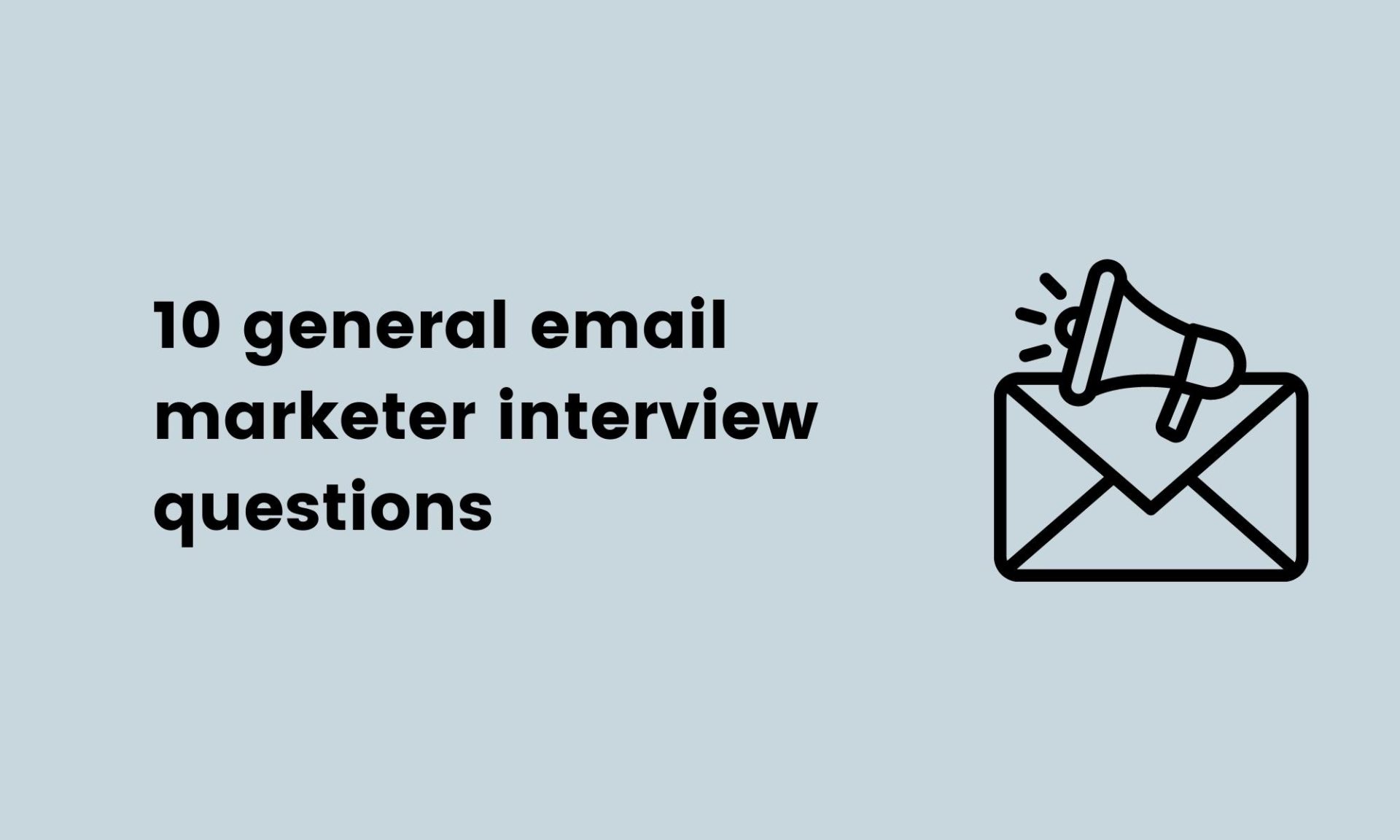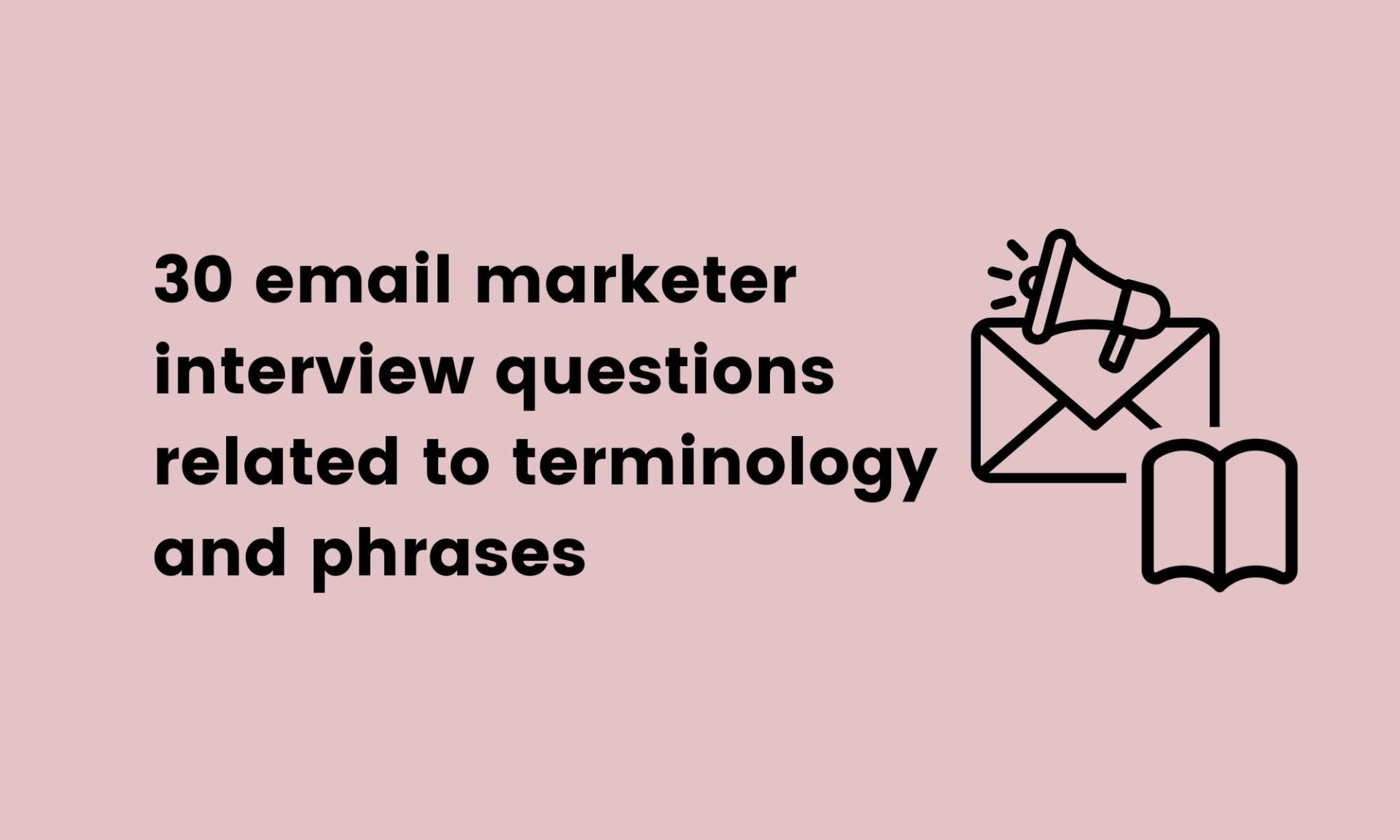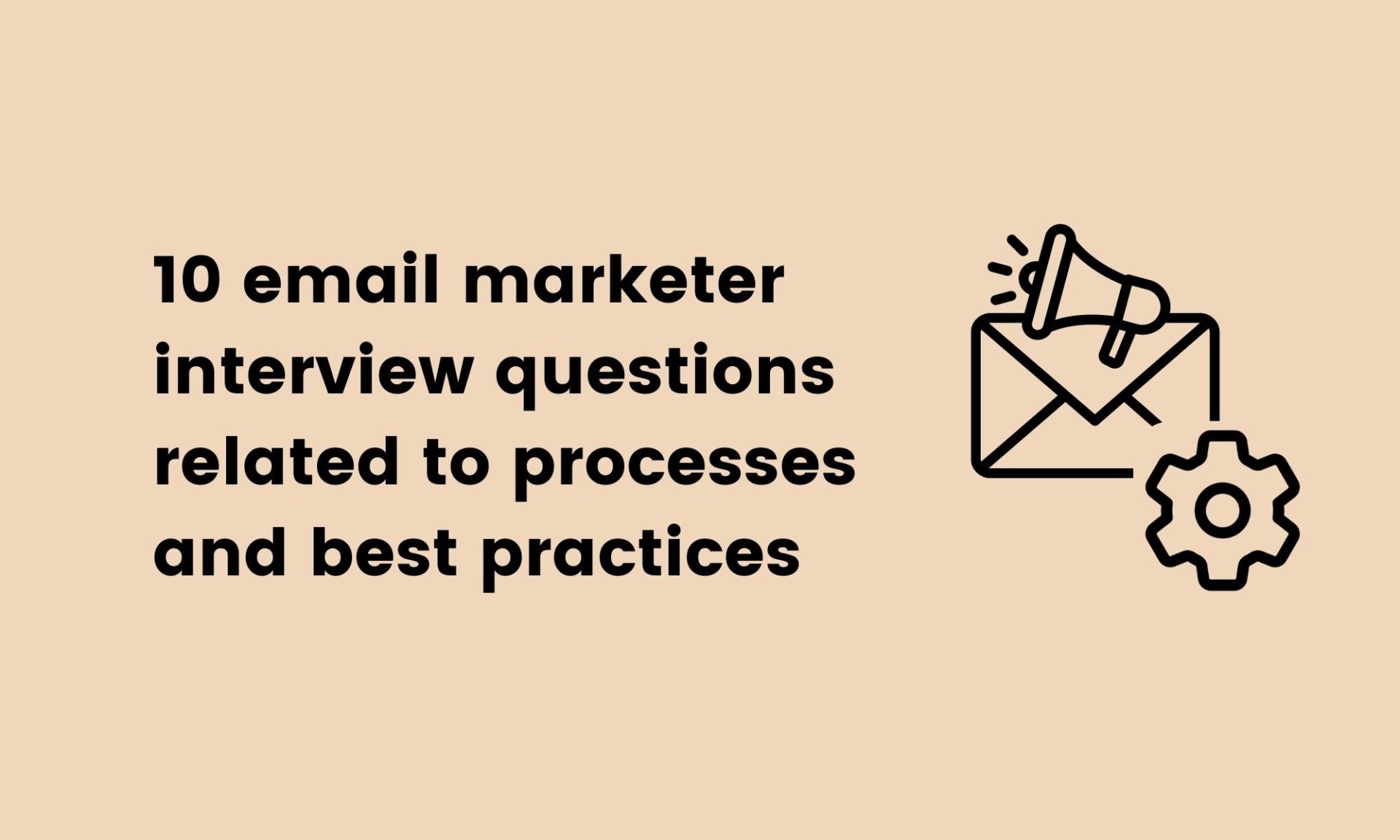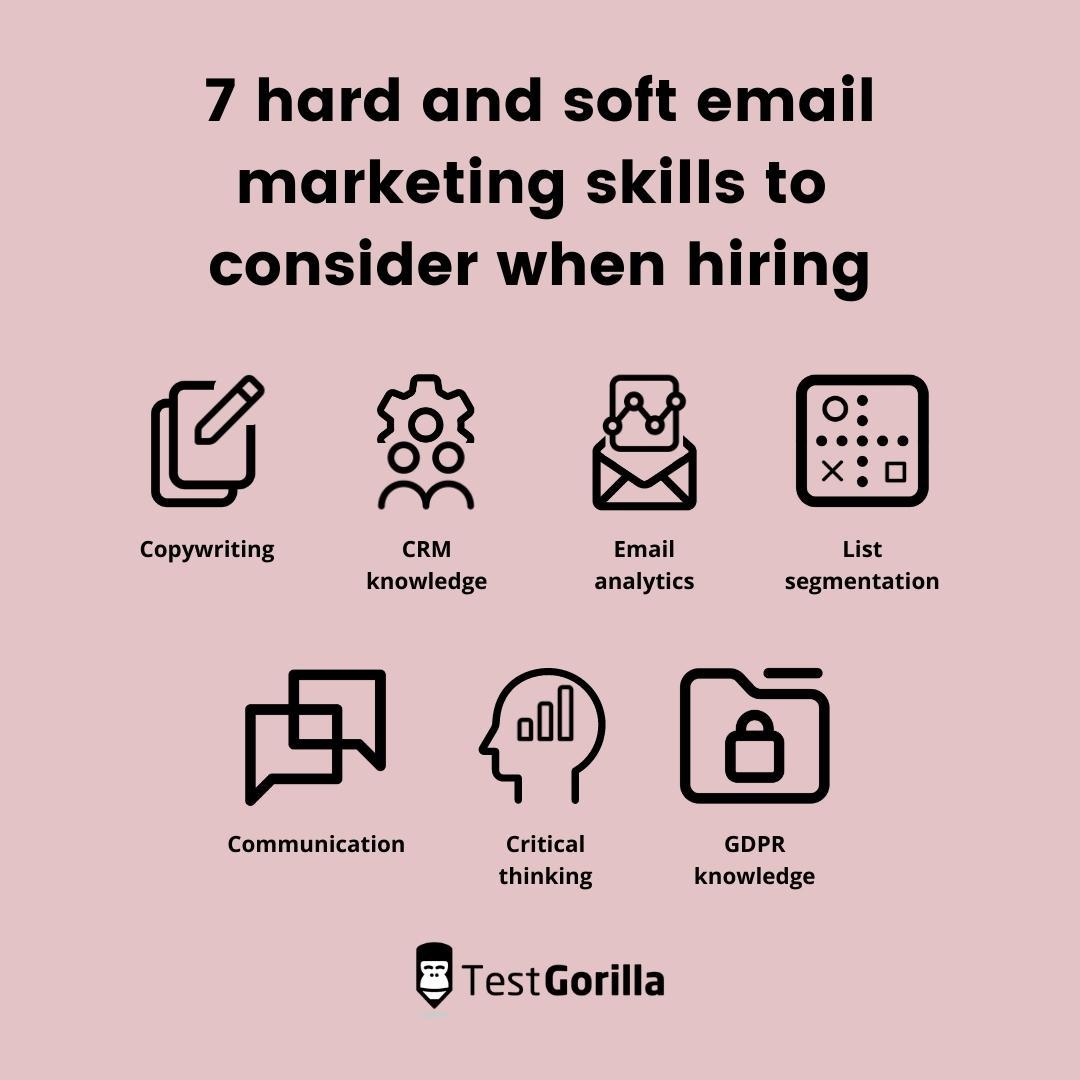50 email marketer interview questions
Email marketing is a key marketing strategy that businesses across the globe use every day.
If your company uses email marketing, you need a professional on your team with exceptional email marketing skills and the right soft skills to craft compelling copy and understand email analytics.
Hiring an expert isn’t easy, but conducting interviews using the right email marketer interview questions is critical to making hiring more efficient.
So, in this article, you can find 50 email marketer interview questions you can ask interviewees to evaluate their knowledge. We’ve also provided sample answers to the most important ones, to give you guidelines of what to expect.
Table of contents
- 10 general email marketer interview questions
- 5 general email marketer interview questions and answers
- 30 email marketer interview questions related to terminology and phrases
- 5 email marketer interview questions and answers related to terminology and phrases
- 10 email marketer interview questions related to processes and best practices
- 5 email marketer interview questions and answers related to processes and best practices
- 7 hard and soft email marketing skills to consider when hiring
- Hire the perfect match with the right email marketer interview questions
10 general email marketer interview questions
Gauge your candidates’ general knowledge when you interview them by asking them these ten general interview questions.
Why have you chosen a career in email marketing?
Which skills do email marketers need?
Which soft skills do email marketers need?
What are your strongest email-marketing skills?
Which email-marketing skills do you need to work on?
Which email-marketing books have helped you advance in your career?
What do you hope to have achieved in three years?
Why did you apply for our email-marketing role?
Describe a successful email-marketing project you have worked on.
How do you remain up to date with the most current email-marketing developments?
5 general email marketer interview questions and answers
Below, you’ll find our selection of five of the questions above, along with sample answers you can use to gauge your applicants’ general email-marketing knowledge and their career ambitions.
1. Which skills do email marketers need?
Interviewees should know that copywriting, lead nurturing, HTML and CSS knowledge and skills, along with strong analytical skills and testing knowledge, are all critical for email marketers.
2. Which soft skills do email marketers need?
Some of the soft skills interviewees may mention when answering this interview question include strategic and critical thinking, time management, and communication skills.
3. What are your strongest email-marketing skills?
Your applicants may mention a combination of hard and soft skills when responding to this question.
For instance, their written communication skills may be their best ability. Does their skillset align with your email-marketing role? Can your applicants give examples of how they have used their strongest skills to achieve outstanding results?
4. Which email marketing skills do you need to work on?
Whether your candidates need to work on their copywriting skills or their A/B testing knowledge, what’s important is that they are using different methods to improve.
Are they following marketing blogs or social media accounts to improve their knowledge? Have they completed any email marketing courses to develop their skills? Have they read any books on email marketing?
5. Why have you chosen a career in email marketing?
Candidates may explain that they enjoy the creative aspect of email marketing, or that they like the challenge of finding innovative ways to share information and insights about their organization’s products with clients.
Look for candidates whose passion for email marketing is evident in their responses.
The best insights on HR and recruitment, delivered to your inbox.
Biweekly updates. No spam. Unsubscribe any time.
30 email marketer interview questions related to terminology and phrases
Evaluate your candidates’ specific knowledge of email marketing during the interview by asking them some of these 30 email marketer interview questions related to terminology and phrases.
Explain what mailability means.
Explain what deliverability means.
Explain how mailability is different from deliverability.
Explain what a hard bounce is.
Explain what a soft bounce is.
Explain the difference between a soft and hard bounce.
Explain what demographic data is.
Explain what firmographic data is.
Explain the main differences between demographic and firmographic data.
Give some examples of demographic data.
Give some examples of firmographic data.
Explain what a CRM is.
Explain what A/B testing means.
Explain what an acceptance rate is.
Explain what bulk emails are.
Explain what a buyer persona is.
Define CTA in email marketing.
Define CTR in email marketing.
Explain what conversion rate means.
Explain what customer acquisition cost means.
Explain what a double opt-in is.
Explain why double opt-in is important.
Explain what engagement rate means.
Explain what list segmentation means.
Define open rate. How would you improve our open rates?
Explain what opt-out means in email marketing.
Explain what personalization means in email marketing.
Explain what drip marketing is.
Explain what an email template is.
Explain what an email sequence is.
5 email marketer interview questions and answers related to terminology and phrases
Use the five answers to the questions related to terminology and phrases in this section to see if your applicants’ email-marketing knowledge is sufficient for your open role.
1. Explain what demographic data is.
Can your interviewees explain that demographic data is data that relates to an individual who’s a prospect or a customer? They may provide examples of demographic data types, such as a customer’s gender or job role.
2. Explain what firmographic data is.
Your interviewees should know that firmographic data is data that relates to a business or firm. They may give some examples of firmographic data when responding to this question, such as the firm’s industry or the number of staff employed there.
3. Define CTA in email marketing.
Email marketing applicants should be familiar with the acronym CTA and know that it means “call to action.” Can they explain that a call to action is a short sentence in an email that incites readers to take an action, such as “download your free guide now”?
4. Explain what double opt-in means in email marketing.
Double opt-in is also referred to as “confirmed opt-in.” It is a step that ensures a recipient is giving their explicit consent to subscribe to an email list.
This type of opt-in requires a verification email, where the recipient needs to click a link to confirm their consent. Applicants should know that double opt-in is linked to GDPR policies.
5. Explain what opt-out means in email marketing.
Can your applicants explain that if a recipient subscribes to a newsletter or email by mistake, or if they no longer wish to receive emails, they may wish to remove themselves from the list, which is known as an opt-out?
Applicants should know that emails should feature an opt-out button that is easy to find and that subscribers should be able to unsubscribe easily if they wish to do so.
10 email marketer interview questions related to processes and best practices
Assess your interviewees’ knowledge of processes and best practices by asking them some of the below email-marketing interview questions during the interview phase.
What is your process for growing an email list?
What is your approach to project management in the context of email marketing?
Explain some of the best practices for drip campaigns.
Which steps would you use to maintain a clean email database?
Which best practices would you use to handle spam complaints?
Which process would you use to monitor deliverability health?
Which process would you use to monitor and reduce unsubscribe rates?
Which process would you use to manage consent records?
Which process would you use to plan end-to-end, account-based marketing campaigns?
Have you ever taken a different approach to email marketing due to high unsubscribe rates?
5 email marketer interview questions and answers related to processes and best practices
Use the answers to the five interview questions related to processes and best practices below to evaluate your interviewees’ responses.
1. Which process would you use to monitor and reduce unsubscribe rates?
Some processes and best practices applicants may mention as part of monitoring and reducing unsubscribe rates include:
Not sending emails too frequently
Not sending irrelevant emails
Setting up email preference centers (EPCs)
Can your applicants also explain that email marketers may monitor the unsubscribe rate by determining the number of unsubscribes, dividing this by the emails that actually were delivered, and multiplying the result by 100?
2. Have you ever taken a different approach to email marketing due to high unsubscribe rates?
To reduce unsubscribe rates, applicants may mention that they monitored the emails sent to recipients and tried to be more selective with their email marketing strategy. They may have sent fewer irrelevant emails or changed their emailing frequency.
3. Which steps would you use to maintain a clean email database?
Three best email database hygiene practices your applicants may mention include:
Cleaning lists to get rid of spam records
Getting rid of invalid email addresses with email verification
Archiving unengaged recipients (such as individuals who have not interacted with emails for a prolonged period)
4. Which best practices would you use to handle spam complaints?
The first and most important step email marketers should take to handle spam complaints include finding out which email was the cause of the complaint. They should then determine whether their list segmentation process could be improved to minimize any negative impact on deliverability.
5. Which process would you use to monitor deliverability health?
Applicants should know they can monitor deliverability by using an overview email campaign report, performing an email deliverability audit, and checking blacklists with tools like MX Toolbox.
Your applicants may also mention the steps they would use to rectify poor deliverability.
7 hard and soft email marketing skills to consider when hiring
When hiring an email marketer, evaluating their skills with skills tests and interviews is important, but which skills should be your main focus?
Here are seven hard and soft email marketing skills to consider when hiring.
1. Copywriting skills
Email marketers need excellent copywriting skills to attract the attention of their readers. The quality of the copy can make or break an email marketing campaign and determine whether a recipient takes an action or the email gets flagged as spam.
Copywriting doesn’t only mean writing a good email body; it involves coming up with powerful subject lines that increase the open rates and including a compelling CTA.
2. CRM knowledge
Email-marketing campaigns’ success also depends on whether marketers can make the most of their customer relationship management (CRM) tools. Applicants who know how to use CRMs to personalize their emails when targeting prospective clients will be able to create and implement successful strategies.
You can use TestGorilla’s tests to see whether your applicants are proficient with Salesforce or HubSpot, two of the most popular CRM systems.
3. Email analytics
The analysis of different metrics and key performance indicators (KPIs) can offer important insights into the efficiency of an email marketing campaign.
Candidates who understand how to review and analyze data will undoubtedly be able to improve their marketing strategies in the future.
Do your applicants have the right email analytics knowledge to develop and enhance their marketing strategies?
4. List segmentation
Can your candidates manage their contacts correctly, create an effective segmentation strategy, and ensure there are no duplicates across lists? Do they understand that successful list segmentation can help with deliverability, open rates, and click-through rates?
5. Communication skills
Written communication is a critical skill for email marketing, as is verbal cross-team communication and the ability to efficiently transmit data and ideas to stakeholders. Communication is also important for sharing A/B test results with key decision makers to determine which campaigns to launch.
You can determine whether your applicants have the required communication skills by using a Communication skills test.
6. Critical thinking
Interpreting the results of an A/B test or analyzing email-analytics data and applying the findings when creating new campaigns depends on the person’s exceptional critical-thinking skills.
Do your applicants have top critical-thinking skills to achieve these marketing goals? Use the Critical-thinking test to find out.
7. GDPR knowledge
Since GDPR policies are related to double opt-in requirements, and email marketers need to protect customer data, GDPR knowledge is a must for applicants.
Find out whether your candidates have thorough GDPR knowledge by asking them to take a GDPR and Privacy test as part of your email marketer assessment.
Hire the perfect match with the right email marketer interview questions
Hiring exceptional talent is vital for your business, but it’s not straightforward.
Recruitment can be made easier, though: For this, you need to use skills testing and the right email marketer interview questions during the interview stage.
This way, you’ll be able to hire the right expert who can take control of your email list, start reducing unsubscribe rates, increase click-through rates, and, most importantly, boost conversions.
TestGorilla’s test library features hundreds of tests to help you hire the right talent for your company and start accomplishing your goals and targets. Sign up for a free plan.
You've scrolled this far
Why not try TestGorilla for free, and see what happens when you put skills first.


















